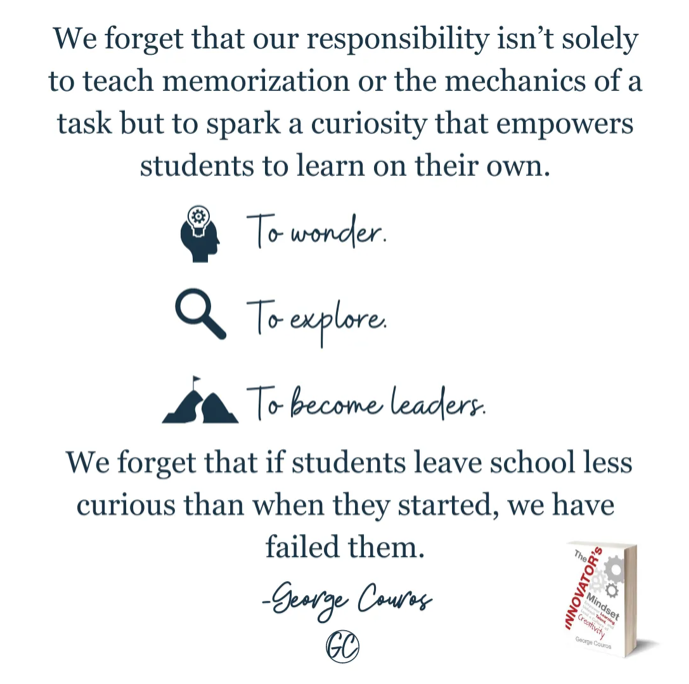I recently posted this video regarding “Focusing on Curiosity in a Time of AI” and how it can kill our curiosity if we become too dependent on technology.
View this post on Instagram
When people say, “Kids are WAY better at technology than we are as adults.” I’m afraid I have to disagree with this in a couple of ways:
- Kids are not smarter than adults with technology, but many kids are more willing to “push buttons” to see what happens that some adults may have lost over time.
- Technology is easier to use now than it was when I was a kid, and that will be true forevermore.
On point one and a question to consider: do schools, in some way, kill that willingness to “push buttons”?
Kids are not smarter than adults with technology, but many kids are more willing to “push buttons” to see what happens that some adults may have lost over time.
For example, this blog post and blog in general. I love writing and using it as a tool for reflection. I have learned more from the process of creating and maintaining this blog over the years than anything else I have done regarding education. That would include all of the PDs I have gone to and led and any university class I have attended.
None of those things were bad, but it is not until I take the time to reflect on what I have learned through this space that I ever feel like I really grasp any ideas or concepts. It has been a game-changer for me.
But what if, at the end of every post, I received a grade that was geared toward perfection? Would that make me want to write more or less?
This doesn’t mean that I don’t appreciate comments and input, but only when those are provided to encourage me to grow and make me think. Seeing a “grade” would push me more toward an endpoint than the learning process.
But also, not all comments are beneficial to the pursuit of learning.
I have brought this up before, but I remember someone reaching out to me, and they were bothered that I wrote “bare with me” rather than “bear with me” in a post. They wrote that because I used the wrong version of “bear,” they could not continue reading the rest of my post because I had lost credibility in their eyes. This was an educator, and they could not get over the wrong use of the word.

Okay.
So, imagine if you worked for that person or that was your teacher. Would that make you want to write more or less?
I have also received comments like this; “Hey George…Loved your post and your thoughts. Just a quick heads-up: In the beginning, using the word ‘bear’ instead of ‘bare’ is correct. Weird, right? Anyway, I loved what you had to share and appreciate this post. It really made me think!”
Not only would I have learned something new, but I would have felt encouraged to continue sharing my learning.
When kids are pushed to focus on perfection over learning, their willingness to “push buttons” into adulthood may be crushed by school.
Technology is easier to use now than it was when I was a kid, and that will be true forevermore.
When I was a kid, making the video I shared at the top of this post would have taken me a couple of days and had no subtitles. I recorded and edited that video within 15-30 minutes (which may even be slow!). But I did it myself, and I am proud of that.
Of course, I used the auto-caption option on CapCut to make the video more accessible, but I appreciate the process of learning how to edit these videos and put these ideas together.
But what would take a few days in my childhood and 30 minutes today could take seconds in the future.
I get it.
But most of my time is spent (right now) reflecting on what I recorded and providing some different insights. I am trading in the time I saved in editing to deepen my learning and create connections to my thinking and experience.
As I wrote this, I recalled a post I wrote in 2015 titled “Taking Notes vs. Taking a Picture of Notes; Which Wins?” I discussed research that shared handwriting notes are better for “recall” than taking a picture of a slide. But is retaining information the goal or understanding information in a profound way?
I shared the following:
“So one is easier and much less time-consuming, and one seems to improve the ability to “retain” information and be able to share it back. So which one is better for learning?
How about neither?
The ability to simply obtain and recite information is not necessarily learning as much as it is regurgitation. I might better be able to retain the facts shared, but it doesn’t mean I understand them. On the other hand, if I am taking a picture, putting it in my camera roll, and doing nothing with that information, then really, what good is that?
What is important here is how you make your own connections for deep learning. Taking a picture is obviously much less time-consuming (why would not just give the information over in the first place?) than writing notes, so with the extra time, the ability to do something with the information is where the powerful learning opportunities happen. For example, taking this picture and writing a blog post on it will help me more than simply retweeting the image in the first place. When I speak, I try to challenge people to create something with the information I have shared, whether writing a blog post, reflection, podcast, video, or any other type of media. If they want to process what I have shared, they will need to make their own connections, not those I have made for them.
Having easy access to the information is great, but what we do with it is what really matters.”
Funny enough, do you know how I “recalled” that information? Because I blogged about it. I have shared this often in presentations and think it is an important point:
“If you memorize information, it doesn’t mean you understand. If you understand the information, you will also have it memorized.”
So yes, technology is easier today than before, and it will only get easier in the future.
But, instead of seeing it as a way to “replace learning,” let’s see it as an opportunity to spend more time deepening our understanding of ourselves, others, and the world around us.
We want to instill that curiosity in our students, so let’s model it ourselves.
